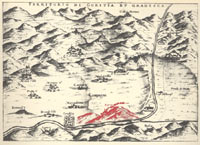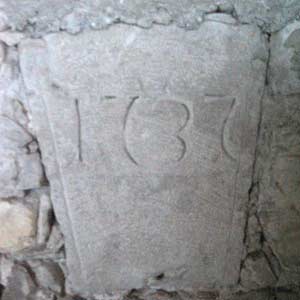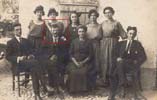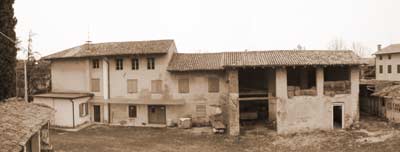|
|
|
|
 |
|
|
|
 |
|
|
|
 |
|
|
|
The Bressan’s, as often happens when we speak of land, vineyards and wine, is a history made up of proper names:
names of lands traditionally given to grape-growing - Farra d’Isonzo - but especially names of persons who, with hard work, tenacity and stubbornness gave birth to a centuries-old tradition. |
|
 |
|
|
|
If within Empress Maria Theresa’s Land Registry there remain traces of the first farmers who, with their wine, paid taxes to the local lords, the De Bresciani barons (from whence the Bressan surname derives), the first name which recounts the history of the family is that of the family founder, Giacomo BRESSAN born in 1726, who began the noble oenological activity;
|
 |
|
|
and with Maria, married in the period which ran from the Peace of Aix-la-Chapelle (1748) to the abolition of the Patriarchate of Aquileia (1751), he had a son, Biagio BRESSAN (5 January 1756 – 3 February 1824).
Napoleon’s cyclone, as he finished his lightning campaign in Italy, struck all of Europe in the 18th century, also turning Friuli upside down.
During the Napoleonic period, Farra was part of the Kingdom of Italy (district of Gradisca, Department of Passariano).
The testimonies of those days tell us that Biagio married Maddalena Perressin: from this union Michele BRESSAN (24 January 1780 - 28 October 1807) was born. Under the influence of the young Bressan heir the wine-making activity of the lands were further specialized.
The premature death of Michele left his widow Caterina Trevisan of Bruma (today known as Mercaduzzo, a district outside the defensive walls of Gradisca) five months pregnant.
His successor was baptised with the same name as his father, Michele BRESSAN (9 February 1808 - 20 February 1850).
In the meantime, the unexpected end of Napoleon and his fictitious empire brought Farra d’Isonzo and the rest of Friuli back under Austrian rule, a dominion which was confirmed in 1815 at the Congress of Vienna. This situation remained substantially unchanged, for Farra, up to the beginning of the First World War.
“Little” Michele’s enterprising spirit was immediately revealed, notwithstanding the misfortune of being born without a father, and even if the first historical moments were not the happiest, the young Bressan began with the first private sales;
married Maddalena Simsig on 28 November 1827, and together with her help and that of his great intuitions, continued producing wines of the highest quality.
Under pressure from the insurrectional activities of scattered patriotic groups of Italians, in 1848 the western portion of Friuli alternated between Italian and Austrian domination at various times: Farra remained constantly under the Hapsburg aegis - on the other hand, the measures of the Austrian government were progressively more respectful of individual ethnic groups, and on the whole satisfied the majority of the country’s citizens.
Michele Bressan continued his feverish activity, but on a very cold morning on 20 February 1850, after loading a wagon of wine casks for delivery, was manoeuvering the horses when he fell under the wheel of the heavy wagon and was crushed to death. The tragic incident left his child, Domenico BRESSAN (28 August 1838 - 9 June 1915), without a father at twelve years old. In the veins of the young boy flowed the tenacious and combative Friulian blood of the Bressans: notwithstanding his young age, he carried forward the family business courageously, further perfecting growing techniques.
At the end of July 1866, the Italian army penetrated Friuli, establishing its general headquarters in Pradamano (Udine); on 12 August of the same year an armistice was signed in Cormòns (Gorizia). Farra d’Isonzo remained under Austrian rule.
Following the Peace of Vienna of 3 October, Austria ceded Venetia to Italy, together with the western portion of Friuli. The new border between the two states was that of the old Logobardo-Venetian Kingdom, thus perpetuating, even worsening the fatal political and cultural division of Friuli.
|
|
|
|
 |
|
It was the year 1864 when Domenico (“Menj” to his friends) married Maria Lorenzon: from this union was born Antonio BRESSAN (24 August 1869 - 14 March 1944), a figure of fundamental importance for the Bressan clan. This descendant of the Bressan dynasty married (28 November 1896) Maria Luigia Sandrin (9 May 1875 - 21 February 1963), a woman of great human depth and rare interior wealth.
|
|
|
|
In 1915, Farra d’Isonzo was tragically scarred by the First World War and the numerous battles which were fought right within its own districts.
|
|
|
 |
|
Antonio Bressan was also drawn into the war, against his will, when he departed for the front in an Austrian uniform. The First World War was a catastrophe both for men and for the grapes. It was thanks to the hard work of Antonio that it became possible to emerge from the family tragedy and destruction. He even managed to expand his property considerably, acquiring portions of the possessions which had
|
|
|
| belonged to the Zuppini Counts, a noble family from Gradisca, whom had settled in Farra d’Isonzo in 1665, and whom gave their name to the district of Farra where they established their farm (which today is still the head office of the Bressan farm). |
|
 |
|
|
Antonio Bressan died on 11 March 1944, and his lands were divided between his seven children Maria, Antonio, Angelica, Caterina, Emilia, Luigi BRESSAN (18 November 1904 – 4 February 1994) and Valeria. The inevitable splitting of the property surely did not help Luigi and his wife Maria Giuseppina Pecorari (16 September 1911 - 22 August 1992) in developing the family farm.
|
|
 |
|
 |
 |
But it was their son Nereo G. BRESSAN (26 July 1932) who improved the fortunes of the family. He had a principal role in re-launching and further specializing the wine-making activities.
In the meantime, the Second World War broke out, forcing little Nereo to make sacrifices and endure hardships right from childhood, which tempered his already combative character.
|
|
|
|
On 2 December 1961, Nereo married Paolina F. Spessot (15 January 1931), niece of the researcher Monsignor Francesco Spessot, glottologist and well-known historian, author of various publications and essays on Friuli and its traditions.
These were the years of the postwar reconstruction--times when farmers were abandoning the countryside to go and work in the factories, whilst the loving couple, after years of hard work and with great intuition, decided to invest the fruits of their labour in a careful and meticulous acquisition of new lots that were most suitable to grape-growing. Aamongst these are the lots already belonging to their grandfather, thus achieving their goal of re-uniting all those properties on which Antonio Bressan had had to work so hard.
|
|
 |
|
 |
|
|
 |
 |
|
|
Having created a solid basis of land possessions, Nereo, bolstered by a record of experience that had its roots in 7 seven generations of history, was finally able to start on his road--great efforts were needed to clean the area, before the vineyards could be planted. Nevertheless, Nereo knew that such a commitment would bear fruit; in fact, the extraordinary nature of the land, supported by an exceptional micro-climate, has been the premises for the creation of great name-brand wines.
|
|
|
 |
|
In these decades of rapid growth, Fulvio L. BRESSAN (3 August 1964) was born, and has turned out to be a great lover of the countryside and wine-growing. After his university studies, he dedicated his tireless efforts to the international promotion of the farm.
|
|
|
|
 |
It was during one of these journeys that he met the fascinating Jelena Misina (27 October 1976), a woman of elegantly practical character, who, upon finishing her university studies, joined him immediately.
The two were wed on 27 August 2000 and have turned out to be a winning couple.
|
|
 |
|
|
 |
|
Their wines have quickly earned recognition at an international level, such that Fulvio was nominated “Nobleman of Friulian Wines” by Duke Emilio I in the presence of the entire ducal court, amidst the superb surroundings of Villa Manin, on the occasion of the summer “Diet” of the Duchy of Friulian Wines.
This is the ninth generation of “master wine-makers”, creators and guardians of a productive reality which has earned the Bressans recognition around the world.
|
|
 |
|
On 27 May 2001, Emanuele BRESSAN was born, and the story continues.........
|
|
|
|
|
|
|
|
|
|
|
|
|
|
|
|
|
|
|
|
|
|
|
|
|
|
|
|
|
|
|
|
|